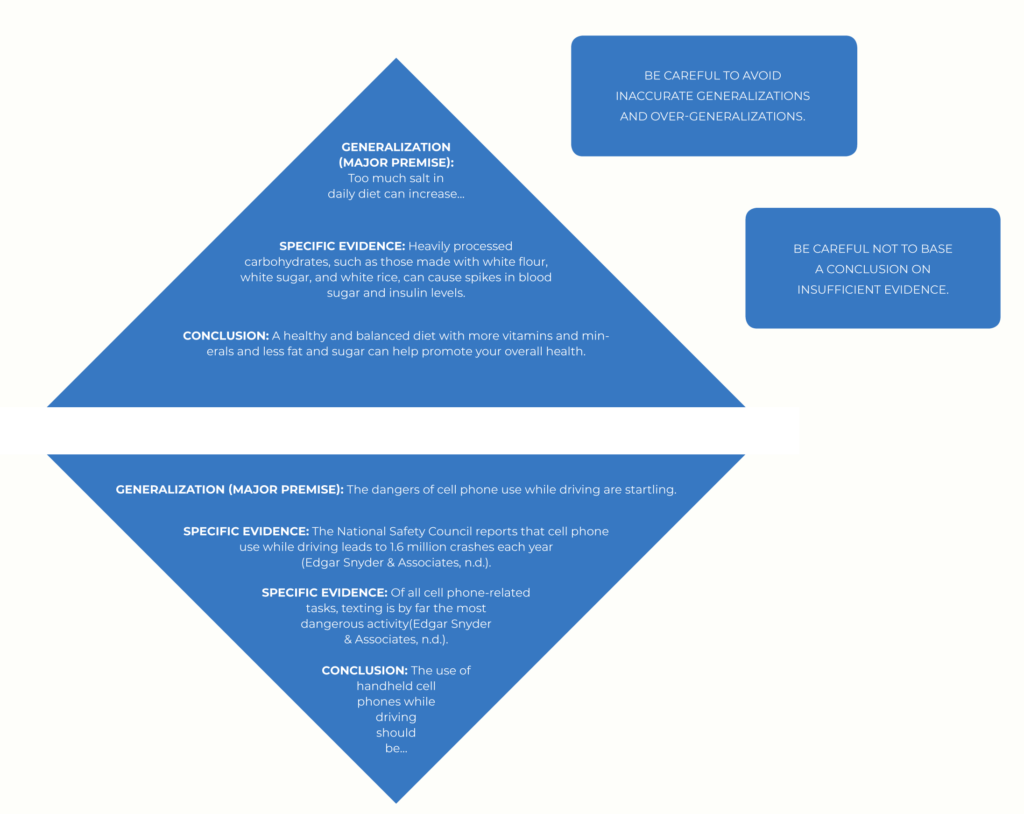35 Persuade and Inform
Qing Mao
In a public speech, speakers often attempt to convince the audience to agree with their opinion. To accomplish this, they provide strong and adequate information and use tools of persuasion.
What You’ll Learn:
- How to make your speech persuasive
- How to make your speech informative
How to Make Your Speech Persuasive
Keep your audience at the centre. If your audience has built up their own perspectives on your topic, you may want to provide strong and adequate evidence before stating your opinion. If your audience know very little about your topic, you might want to state your opinion at the beginning, then provide evidence for it.

To persuade your audience, you need to give them ample attention. You should have direct and extended eye contact and pay attention to their reactions.
Audience-centred communication allows the speaker to tailor the message to the needs of their listeners.

How to Combat Short Attention Spans
• Give a surprising statement at the beginning of the speech.
• Include an anecdote or personal experience in the speech.
• Engage the audience with questions or activities.
• Do not linger over unimportant details.
• Use transition signals to lead the audience through your story.
• Use humour to make your audience laugh.
• Make slides image heavy, not text heavy.
Build credibility in your introduction
It’s essential to win trust from the audience at the beginning of your speech. For example, if you are giving a speech on the benefit of sports, you could use the following strategies in your opening.
| OPENING STRATEGIES | EXAMPLES |
|---|---|
| Reveal a personal connection to your topic. | Running a marathon has completely changed my life. I’ve learned to be resilient. Success doesn’t build character; failure does. |
| State your credentials. | I’m a marathon coach. I’ve won the Boston Marathon three times. Now I’m teaching people how to build resilience not only physically but also mentally. |
| Establish common ground with your audience. | Have you ever tried running a marathon but had to give up because it was too challenging to continue? I’ve been there. |
| Show your knowledge, experience, and insights. | I’ve been running marathons for 15 years. I started running to build my stamina, but then I realized it also enables me to achieve so many other things, such as social skills, confidence, and expression of emotions. |
Remember, you’re the message. Speak loudly, clearly, and confidently. Use your gestures and facial expressions to reinforce your credibility.
Learn more about establishing credibility here.
View the source for seven memorable ways to open a speech.
Choose the right persuasive approach
Aristotle proposed three argumentative appeals (three ways to persuade your audience): logical, ethical, and emotional. Strong arguments have a balance of all three.
Logical appeal is the strategic use of logic, claims, and evidence to convince an audience of a certain point.
Ethical appeal is used to establish the speaker as fair, open-minded, honest, and knowledgeable about the subject matter. If audience members believe the speaker is trustworthy and credible, they are more likely to be persuaded by the speaker’s points.
Emotional appeal targets the emotions of the audience to create some kind of connection with the speaker (“The Three Appeals of Argument,” n.d.).

Logical Appeal
(Reason/Proof)
Structured speech (opening/body/conclusion)
References to studies, statistics, case studies…
Use of comparison, analogies, metaphors…

Ethical Appeal
(Credibility/Trust)
Personal branding
Confidence in delivery
Cite credible sources

Emotional Appeal
(Emotion/Values)
Stories
Inspirational quotes
Vivid language
See more about the three appeals here.
Let’s say a speech is about individual endeavours to stop and overcome environmental destruction:
| APPEALS | EXAMPLES |
|---|---|
| Logical Appeal | Our earth provides us with air, food, and many other needs. Humanity depends on a healthy and sustainable environment to carry on our daily activities. It is essential for us to protect the natural environment. |
| Ethical Appeal | The environment is deteriorating. I’ve spent the past 10 years studying how climate change has brought detrimental effects on our surroundings. David Attenborough, a British natural historian, says, “If we don’t take climate action, the collapse of our civilizations and the extinction of much of the natural world is on the horizon” (Katowice, 2018). |
| Emotional Appeal | Every day animals lose their homes when trees are chopped down. This makes them more vulnerable to predators and other dangerous conditions. If we become more aware of this serious issue and start to take protective action, we could save these beautiful forests and the animals who call them home. |
You can learn more about persuasive speaking here.
How to Make Your Speech Informative
Use lots of evidence

Examples serve as logical appeal. They help prove your point. They also serve as emotional appeal. Examples are more interesting to listen to than opinion or a long list of facts.
Evidence used in your speech needs to be credible. It can be facts and figures from respected authorities, charts and graphs, anecdotes, and personal experience.
A speaker talking about the valuable lesson learned from failure uses a variety of evidence to support their ideas in the following passage.
People always enjoy the moments of success and avoid the experience of failure without knowing the latter can be the catalyst for life-long development. While feeling successful brings pride and confidence, failure makes us feel lost and discouraged. In this success-driven society, failure is considered deficiency. However, failing doesn’t mean failure. Bill Gates, an American business magnate, says, “Success is a lousy teacher. It seduces smart people into thinking they can’t lose.” Failing can push people to reach their potential and help them gain new perspectives. Walt Disney was told he lacked creativity. Milton Hershey started three candy companies before Hershey’s and watched all of them fail. It is those who can’t lose who will fall victim to setbacks. If Thomas Edison could take 10,000 steps before the invention of the light bulb, why can’t we learn the lessons from failure and gain a real sense of achievement?
Address the counterargument
This gives you a chance to address your audience’s possible objections and make your argument stronger.

You’re giving a talk on euthanasia- also known as medically assisted suicide. Your argument is that ending a loved one’s life in order to ease their pain should be allowed if the patient has consented. During the talk, you could address the opposing viewpoint: Allowing someone to murder another living human is immoral. Then, provide strong and adequate evidence to prove this argument isn’t valid in this case.
Including a counterargument in your speech shows you know and understand that other positions exist, you’ve considered those, and you can respond to them. Doing this gives you credibility and can strengthen your argument.
You can learn more about counterarguments here.
Conclude with a call to action

If you add a call to action at the end of your speech, you tell your audience the role they can play after they leave your talk. It gives an audience concrete tasks to tackle, which helps bring your ideas to life.
If your talk is about charitable work, you could ask your audience to donate to a charity at the end of your speech. If your talk is about the importance of a balanced diet, you could urge your audience to eat more vegetables. If your talk is about how running can help strengthen the immune system, you could encourage your audience to train for an upcoming marathon.
Now you’ve learned how to make your speech persuasive and informative. When you draft your speech, remember to use some of these strategies to make it more engaging and effective.
Try It!
Watch the TED Talk by Brian Little, an internationally acclaimed scholar and speaker in the field of personality and motivational psychology.
Strong speakers use strategies to win over the audience. Match what Dr. Little does in the speech in column B with the strategies in column A.


In this example, the speaker is quoting Bill Gates to support their ideas. The speaker also uses real-life examples to build common ground with the audience: While success can make us complacent, failure can inspire us to carry on.